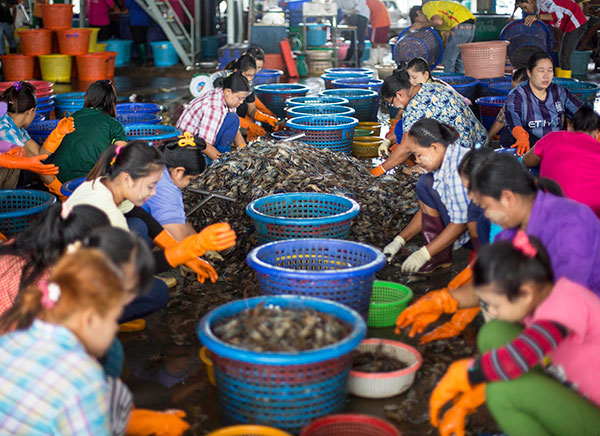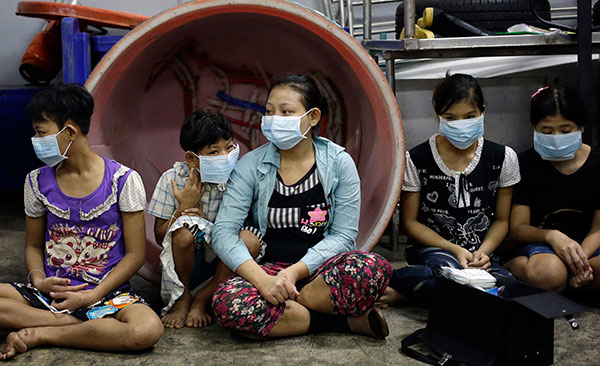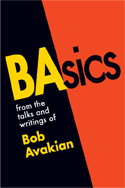Case #46: Slavery in Thailand's Shrimp Industry
February 5, 2018 | Revolution Newspaper | revcom.us
Bob Avakian recently wrote that one of three things that has “to happen in order for there to be real and lasting change for the better: People have to fully confront the actual history of this country and its role in the world up to today, and the terrible consequences of this.” (See “3 Things that have to happen in order for there to be real and lasting change for the better.”)
In that light, and in that spirit, “American Crime” is a regular feature of revcom.us. Each installment focuses on one of the 100 worst crimes committed by the U.S. rulers—out of countless bloody crimes they have carried out against people around the world, from the founding of the U.S. to the present day.
See all the articles in this series.
THE CRIME:
Americans certainly love their shrimp. They consume more of it than any other seafood, 1.3 billion pounds a year, about four pounds per person. Most of the shrimp have been peeled and cleaned, so consumers can conveniently move them straight from the refrigerator to the skillet. What most Americans don’t know, and what is largely hidden from them, is what makes it possible for them to enjoy their favorite seafood: workers who have been enslaved, often held in debt bondage and by other means, in Thailand, where a major portion of America’s shrimp comes from.
Seafood is a major, $7 billion industry in Thailand, employing 650,000 workers, and it’s anchored by tens of thousands of slave laborers. Most are impoverished migrant fishermen from Cambodia, Laos, and Myanmar desperate to find any work they can. As Thailand’s seafood export industry has expanded in recent years, agents have begun recruiting migrant children and the disabled. They lie about wages and drug and kidnap migrants, who are sold to Thai captains of fishing vessels or the companies that own them. A slave costs about $1,000 to buy, and the workers are forced to pay off their “debt” with their wages, which often aren’t paid for months, years, or sometimes not at all.
Thailand is one of the world’s main shrimp-exporting countries, and it sends nearly half of its annual catch to the U.S., which imports 90 percent of its shrimp. Thai shrimp is one of the main sources of shrimp for the U.S. market overall, and for the production and supply chains of major U.S. food stores and retailers such as Walmart, Costco, Kroger, and Whole Foods, and major restaurant chains such as Red Lobster and Olive Garden. Thai shrimp are also found in well-known U.S. seafood brands and pet foods, sold through grocery store chains with tens of thousands of outlets at which millions of Americans shop.
The fishing crews who catch the shrimp work long hours and are often the targets of physical abuse. A 2013 International Labor Organization survey of nearly 600 fishermen working aboard Thai boats found that nearly 25 percent worked 20-hour days, seven days a week, with another 14 percent reporting “indefinite” hours. Another study found that a number of fishermen were force-fed methamphetamine to get them to work harder, faster, longer. On one boat, torture and execution awaited migrant workers who tried to flee. Some corpses were thrown in the water, these bruised bodies later found weighted down by chains. “They would torture and murder the fishers then throw them into the sea,” said an escaped trafficking victim.” Such eyewitness reports of murder at sea are common.
Much of the catch is taken to one of the hundreds of shrimp cleaning and peeling sheds in a port town just an hour outside the capital city of Bangkok. Some are no bigger than a large garage and they’re packed with locked-down laborers who are frequently beaten. Slave laborers are locked inside, forced to peel and clean shrimp nearly around the clock with no days off. “Sometimes when we were working, the tears would run down our cheeks because it was so tiring we couldn’t bear it,” one reported. A woman eight months pregnant miscarried on the shed floor but was told to keep working even while hemorrhaging. A pregnant woman who escaped was tracked down, sent back to the shed, and handcuffed to another laborer to prevent her from escaping again. Some 10,000 children, boys and girls between ages 13 and 15 toil in sheds like these.
After the shrimp are cleaned and peeled in factories and sheds, they’re loaded on trucks and sent to several major Thai exporting companies, which then sell shrimp in vast quantities to large U.S. conglomerates like the Chicken of the Sea Eastern Fish Company. These conglomerates then resell the shrimp to food manufacturers to make processed and frozen foods, to retailers and food service providers including restaurants, and to brands sold directly to consumers and retailers.
THE CRIMINALS:
U.S. government: Enforces overall U.S. imperialist domination of Thailand, including by backing its reactionary, pro-U.S. regime and by encouraging, protecting, and facilitating the exploitative economic ties and relations with Thailand. The U.S. State Department has issued reports critical of Thailand for slave labor and other abuses, but recently the U.S. has claimed things are improving. Human rights groups like Humanity United, however, write they haven’t seen “significant change,” that “egregious abuse in the seafood industry” continues, and “If anything, conditions are worsening for migrant workers, rather than improving.”
U.S. food stores and retailers, restaurants, seafood brands and pet foods, and U.S. capital overall, which dominate and shape global production and supply chains and reap extra, or super, profits from the extensive use of cheap slave labor. They’ve fought public efforts to stop them from selling slavery-produced shrimp, and U.S. courts have supported them. In January 2017, a U.S. federal judge dismissed a suit claiming that giant retailer Costco has knowingly sold frozen prawns involving farming by Thai slave labor. He ruled that plaintiffs failed to establish that Costco had to inform customers that slavery could be involved in the prawns it was selling.
Thai government: The ruling military junta has claimed repeatedly it is cracking down on slavery and human trafficking in the seafood industry, and has passed various measures to do so. But human rights groups report that in reality, slavery, trafficking, and murder still pervade the seafood industry. Thai police and the judiciary are complicit. Arrests and prosecutions of those engaging in slavery and trafficking are practically nonexistent. When police raid factories and sheds, they often send migrant workers to jail, while owners go unpunished. Former slaves report that police take them into custody and then sell them to agents who in turn sell them back into the seafood industry.
THE ALIBI:
The U.S. government claims the Thai military government is continuing to make progress in tackling the problem of slave labor and human trafficking, and therefore no punitive action, such as sanctions, is required. Multinational giants like Walmart and Costco claim they are unaware of the use of Thai slave labor, or that the supply chain is so complex that it’s impossible for them to trace and be able to tell whether the shrimp they sell are slave-produced.
THE REAL MOTIVE:
The highly integrated and developed production chain that brings slave-produced Thai shrimp from the ocean to U.S. dinner tables is shaped and dominated by global capitalism, U.S. capitalism-imperialism in particular. The global use of outsourcing and subcontracting is a core feature of global capitalist production today. It’s enormously advantageous to U.S. capitalism-imperialism, increasing its profitability and flexibility, and freeing it of the “burdens” of environmental, labor, or other regulations. And it gives these global exploiters “plausible deniability”—“someone else enslaved the workers, we knew nothing.”
This whole economic setup is enforced by the power of the imperialist state, including by backing, protecting, even sometimes installing brutal, oppressive regimes that serve imperialism.
Thailand is one of them. For many years it has been the U.S.’s staunchest Southeast Asian ally. During the Vietnam War, Thailand hosted seven air bases from which U.S. aircraft launched daily missions to strike strategic targets in South and North Vietnam and Laos. Thailand also hosted a U.S. naval base and port facilities that brought critical military supplies to the region. At the war’s height, nearly 50,000 U.S. military personnel were stationed throughout Thailand, and some 40,000 Thai soldiers and sailors fought alongside Americans as part of the so-called Free World Forces.
Today, the U.S. imperialists consider Thailand a critical enabler of their strategic interests in the region, including in the “War on Terror.” Top al-Qaida suspect Abu Zubaydah was waterboarded and subjected to other illegal torture at a secret “black site” in Thailand during CIA interrogation operations in 2002. The U.S. also sees Thailand as an important ally against China’s growing influence in Southeast Asia. And there are extensive economic, trade, and investment links between the two countries. In October 2017, Trump rolled out the White House red carpet for Thailand’s prime minister, the very person who in 2014, as commander in chief of the army, overthrew the elected government.
These are the reasons the U.S. refuses to seriously consider sanctions or other actions that would help end the living nightmare in which tens of thousands of slaves in Thailand’s seafood industry are enmeshed.
Sources:
“An AP investigation helps free slaves in the 21st Century,” Associated Press, July 2016
“Thailand’s Seafood Slaves: Human Trafficking, Slavery and Murder in Kantang’s Fishing Industry,” Environmental Justice Foundation, London, November 30, 2015
“Exclusive: U.S. to upgrade Thailand in annual human trafficking report,” Reuters, June 28, 2016
“Retail giant Costco wins dismissal of prawn lawsuit over Thai forced labor,” Reuters, January 25, 2017
“Thailand: Forced Labor, Trafficking Persist in Fishing Fleets,” Human Rights Watch, January 23, 2018
“Thai seafood: are the prawns on your plate still fished by slaves?” The Guardian, January 23, 2018
Volunteers Needed... for revcom.us and Revolution
If you like this article, subscribe, donate to and sustain Revolution newspaper.


 Shrimp caught by slaves on Thai boats are cleaned and peeled in steamy, inhumane factories and sheds. Thailand exports nearly 50 percent of its annual catch to the U.S. The U.S. government has long criticized Thai seafood industry and Thai authorities for human trafficking and indentured labor but has done little to prevent it. Photo:
Shrimp caught by slaves on Thai boats are cleaned and peeled in steamy, inhumane factories and sheds. Thailand exports nearly 50 percent of its annual catch to the U.S. The U.S. government has long criticized Thai seafood industry and Thai authorities for human trafficking and indentured labor but has done little to prevent it. Photo:  After a November 2015 raid on a shrimp shed in Thailand, children wait to be taken to a government shelter for human-trafficking, where they might have to stay for years, or get deported back to Myanmar. Photo:
After a November 2015 raid on a shrimp shed in Thailand, children wait to be taken to a government shelter for human-trafficking, where they might have to stay for years, or get deported back to Myanmar. Photo:  Not only did slavery play a major role in the historical development of the U.S., but the wealth and power of the U.S. rests today on a worldwide system of imperialist exploitation that ensnares hundreds of millions, and ultimately billions, of people in conditions hardly better than those of slaves. Now, if this seems like an extreme or extravagant claim, think about the tens of millions of children throughout the Third World who, from a very, very early age, are working nearly every day of the year—as the slaves on the southern plantations in the United States used to say, “from can’t see in the morning, till can’t see at night”—until they’ve been physically used up....These are conditions very similar to outright slavery....This includes overt sexual harassment of women, and many other degradations as well.
Not only did slavery play a major role in the historical development of the U.S., but the wealth and power of the U.S. rests today on a worldwide system of imperialist exploitation that ensnares hundreds of millions, and ultimately billions, of people in conditions hardly better than those of slaves. Now, if this seems like an extreme or extravagant claim, think about the tens of millions of children throughout the Third World who, from a very, very early age, are working nearly every day of the year—as the slaves on the southern plantations in the United States used to say, “from can’t see in the morning, till can’t see at night”—until they’ve been physically used up....These are conditions very similar to outright slavery....This includes overt sexual harassment of women, and many other degradations as well.